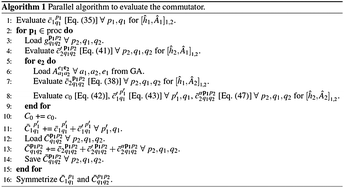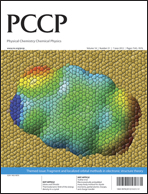Extended implementation of canonical transformation theory: parallelization and a new level-shifted condition
Abstract
The canonical transformation (CT) theory has been developed as a multireference electronic structure method to compute high-level dynamic correlation on top of a large active space reference treated with the ab initio density matrix renormalization group method. This article describes a parallelized algorithm and implementation of the CT theory to handle large computational demands of the CT calculation, which has the same scaling as the coupled cluster singles and doubles theory. To stabilize the iterative solution of the CT method, a modification to the CT amplitude equation is introduced with the inclusion of a level shift parameter. The level-shifted condition has been found to effectively remove a type of intruder state that arises in the linear equations of CT and to address the discontinuity problems in the potential energy curves observed in the previous CT studies.

- This article is part of the themed collection: Fragment and localized orbital methods in electronic structure theory

 Please wait while we load your content...
Please wait while we load your content...